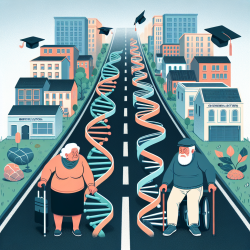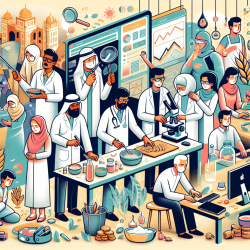The study "Heterogenous trajectories in physical, mental and cognitive health among older Americans: Roles of genetics and life course contextual factors" provides valuable insights into the complex interplay of genetics, socioeconomic status (SES), and educational attainment in determining health outcomes among older adults. As practitioners in the field of special education and therapy services, understanding these dynamics can significantly enhance our ability to tailor interventions and support to better meet the needs of our clients.
Understanding Health Trajectories
The research utilized group-based trajectory modeling (GBTM) to identify distinct health trajectories among older adults aged 51-94 years. This approach revealed that individuals follow varied paths in terms of body mass index (BMI), depressive symptoms, and cognitive function. By recognizing these diverse trajectories, practitioners can better appreciate the heterogeneity in aging populations and adapt their strategies accordingly.
The Role of Genetics and Socioeconomic Factors
The study highlights the significant influence of genetic predispositions on health outcomes. For instance, polygenic scores (PGS) for BMI, depression, and cognition were found to be predictive of trajectory group memberships. However, socioeconomic factors, particularly educational attainment, emerged as robust predictors of more favorable health trajectories. This underscores the importance of considering both genetic and environmental factors when designing interventions.
- Genetic Predispositions: Genetic factors play a role in determining an individual's likelihood of following certain health trajectories. Practitioners should consider genetic information when available to tailor interventions.
- Socioeconomic Status: Childhood SES and adult educational attainment significantly impact health outcomes. Higher education levels are associated with better BMI management, lower depressive symptoms, and higher initial cognition.
Implications for Practitioners
The findings suggest that practitioners should adopt a holistic approach that integrates genetic insights with socioeconomic contexts. Here are some actionable steps:
- Personalized Interventions: Utilize genetic information to customize therapy plans, ensuring they align with individual predispositions and needs.
- Focus on Education: Encourage educational opportunities for clients as a means to improve long-term health outcomes.
- Cultural Competence: Be mindful of the diverse backgrounds of clients, considering how cultural and socioeconomic factors may influence their health trajectories.
Encouraging Further Research
This study opens avenues for further exploration into how practitioners can leverage these findings to enhance their practice. By engaging in ongoing research and professional development, practitioners can stay informed about emerging trends and evidence-based strategies.










